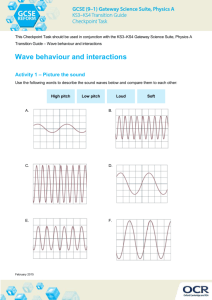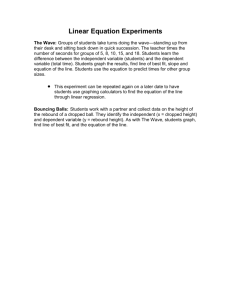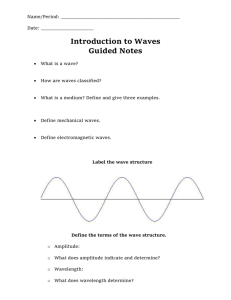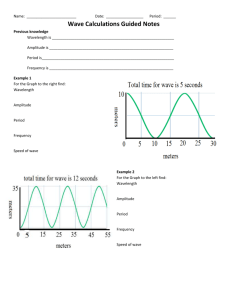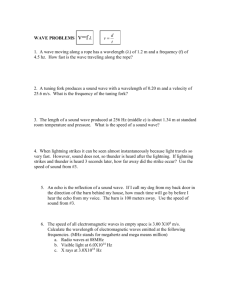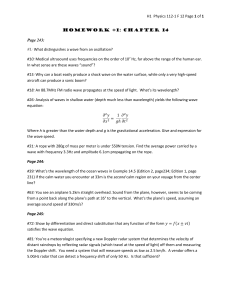Waves Study Guide: Physics Multiple Choice Questions
advertisement
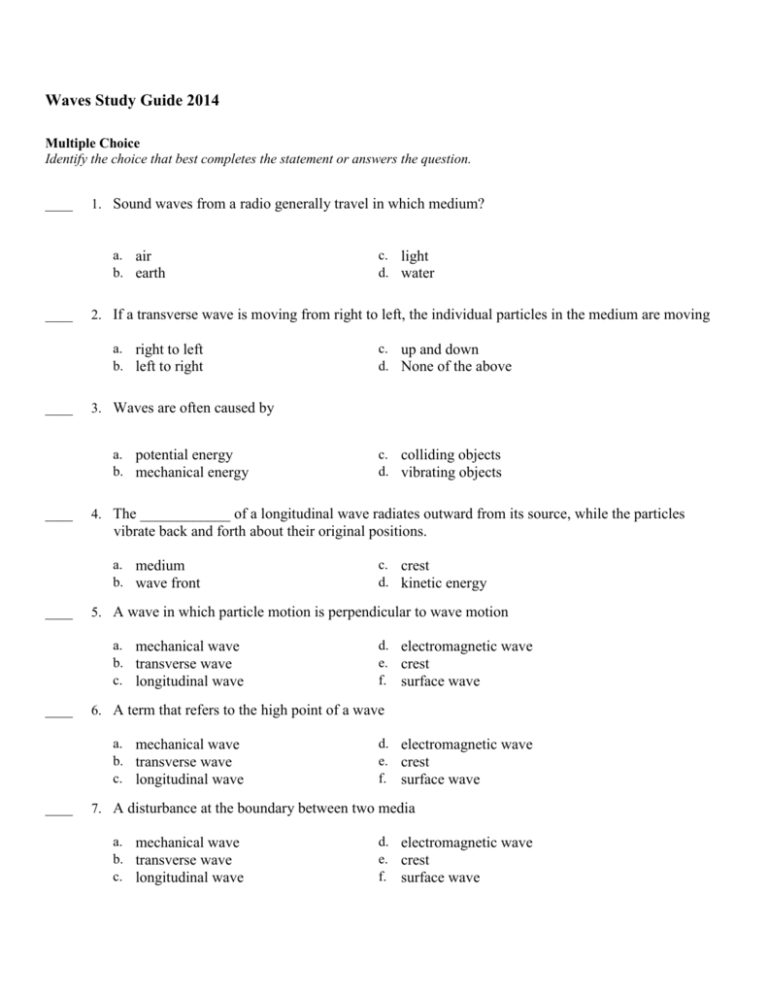
Waves Study Guide 2014 Multiple Choice Identify the choice that best completes the statement or answers the question. ____ 1. Sound waves from a radio generally travel in which medium? a. air b. earth ____ 2. If a transverse wave is moving from right to left, the individual particles in the medium are moving a. right to left b. left to right ____ c. up and down d. None of the above 3. Waves are often caused by a. potential energy b. mechanical energy ____ c. light d. water c. colliding objects d. vibrating objects 4. The ____________ of a longitudinal wave radiates outward from its source, while the particles vibrate back and forth about their original positions. a. medium b. wave front ____ 5. A wave in which particle motion is perpendicular to wave motion a. mechanical wave b. transverse wave c. longitudinal wave ____ d. electromagnetic wave e. crest f. surface wave 6. A term that refers to the high point of a wave a. mechanical wave b. transverse wave c. longitudinal wave ____ c. crest d. kinetic energy d. electromagnetic wave e. crest f. surface wave 7. A disturbance at the boundary between two media a. mechanical wave b. transverse wave c. longitudinal wave d. electromagnetic wave e. crest f. surface wave ____ 8. A wave that requires a medium in which to travel a. mechanical wave b. transverse wave c. longitudinal wave ____ d. electromagnetic wave e. crest f. surface wave 9. A wave in which particle motion is parallel to wave motion a. mechanical wave b. transverse wave c. longitudinal wave d. electromagnetic wave e. crest f. surface wave ____ 10. A wave that consists of oscillating electromagnetic fields, radiating outward at the speed of light a. mechanical wave b. transverse wave c. longitudinal wave d. electromagnetic wave e. crest f. surface wave ____ 11. Our eyes can detect light only within a range of ____________ called visible light. a. frequencies b. speeds c. mediums d. periods ____ 12. Calculate the wave speed for a wave with a wavelength of 2 m and a frequency of 0.3 Hz. a. 0.6 m/s b. 1.67 m/s c. 0.15 m/s d. 2.3 m/s ____ 13. The maximum displacement of a particle by a wave is called a. amplitude b. wavelength c. frequency d. period ____ 14. What is the period of a wave with a wave speed of 50 m/s and a wavelength of 10 mm? a. 2 s b. 0.2 s c. 0.02 s d. 0.0002 s ____ 15. The ____________ is the distance between two crests of a wave. a. amplitude b. wavelength c. frequency d. period ____ 16. The speed of a sound wave a. depends on wavelength. b. depends on the medium. c. depends on amplitude. d. None of the above ____ 17. The ____________ is the time it takes for one full wave in a medium. a. period b. frequency c. amplitude d. wave speed ____ 18. Waves travel quickly in a ____________ because the molecules are closely packed and physically bonded together. a. liquid b. gas c. solid d. None of the above ____ 19. ____________ is the inverse of period. a. Wavelength b. Crest c. Frequency d. Amplitude ____ 20. The Doppler effect is an observed change in a wave’s a. wavelength b. period c. amplitude d. frequency ____ 21. The greater the frequency of the wave in a particular medium, the greater the wavelength of the wave. a. True b. False ____ 22. Radio waves are an example of mechanical waves. a. True b. False ____ 23. Light waves are examples of transverse waves. a. True b. False ____ 24. The energy of a mechanical wave depends on the frequency of the wave. a. True b. False ____ 25. As the period of a wave increases, the frequency increases. a. True b. False ____ 26. When a wave reflects from a fixed boundary, the only change in the wave is the direction of travel. a. True b. False ____ 27. Two waves cannot occupy the same space at the same time. a. True b. False ____ 28. A wave transports energy but not matter. a. True b. False ____ 29. Sound waves are examples of longitudinal waves. a. True b. False ____ 30. Nodes in a standing wave are the result of constructive interference. a. True b. False


